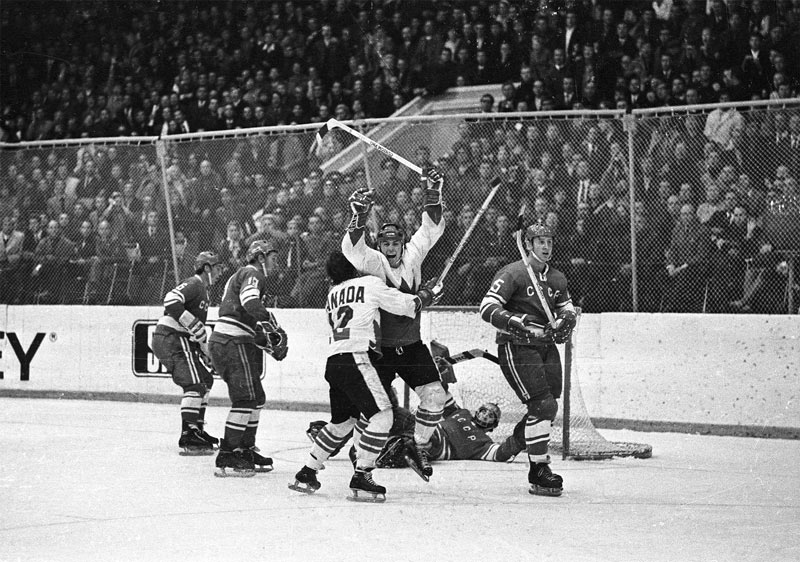
Paul Henderson jumps for joy after scoring the winning goal in the final game of the Summit Series. [Frank Lennon/LAC e008440339]
On Sept. 2, 1972, I was a teenager spending the weekend at a friend’s cottage. They had a television there. My pal and I were torn between going to a party—there would be girls there, we were told—and watching Canada play the Soviets. Then Phil Esposito scored 30 seconds after the opening faceoff. My friend and I predicted a final score of 25-0 for the good guys. We left.
There were no girls at the party, and we returned to learn the Soviet Union had won 7-3.
We, along with the entire nation, were stunned.
How could a bunch of amateurs beat our best professionals. The Soviets had teamwork, crisp passing and goalie Vladislav Tretiak—Canadian scouts had only seen him play once and their report said he couldn’t stop a balloon. (He’d allegedly been hung-over following a bachelor celebration.)
The result of the first game triggered an existential crisis for Canadians. Almost everyone had expected swift, merciless victory and a sweep of the eight-game series. It had never occurred to me and millions of others that Canada could actually lose the matchup.
It was no longer just a hockey series—it was democracy versus communism.
The Canadians had better equipment than the Soviets and were playing at home. What would happen when the team headed to the Soviet Union to play four games in Moscow surrounded by frenzied fans?
Canadian coach Harry Sinden juggled the lineup for the second game and got a better result: 4-1 Canada. Game three was a 4-4 tie. Canada looked lost in game four, confused by the tic-tac-toe passing of the Soviets. The Vancouver crowd booed the 5-3 loss, and Esposito gave an impassioned post-game interview promising the Canadians would get better.
Team Canada arrived in the Soviet capital to find the beer and steaks they had sent had vanished. They would have to settle for borscht and vodka. Now it was no longer just a hockey series—it was democracy versus communism. At least that’s what it felt like.
The Soviets won the fifth game. Paul Henderson, who had scored twice in that one, scored the winning goals in games six and seven, setting up the decisive final match.
Team Canada was called for two questionable penalties by German referee Josef Kompalla in the first three minutes and the Soviets scored a power play goal (one of three they tallied in the game). Jean-Paul Parise threatened Kompalla with his stick and was ejected.
Canada was down 5-3 after the second period. Esposito scored early in the third, then Yvan Cournoyer batted in a rebound, though the red goal light didn’t turn on. Alan Eagleson, head of the NHL Players’ Association, made for the ice to protest. Russian soldiers headed him off, but Canada’s Pete Mahovlich led a group of
teammates to rescue him. The goal counted.
With a minute left, the game was still tied. In my teenaged mind, I imagined that, if the Russians had won, Soviet tanks would roll onto Parliament Hill, we would be
speaking Russian in school and wearing unfashionable clothes.
Then, with 34 seconds left…Henderson, mighty Henderson, scored to save the free world
Advertisement





















